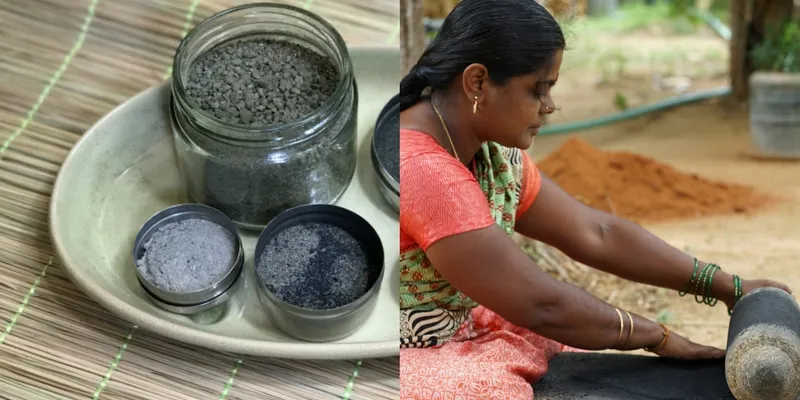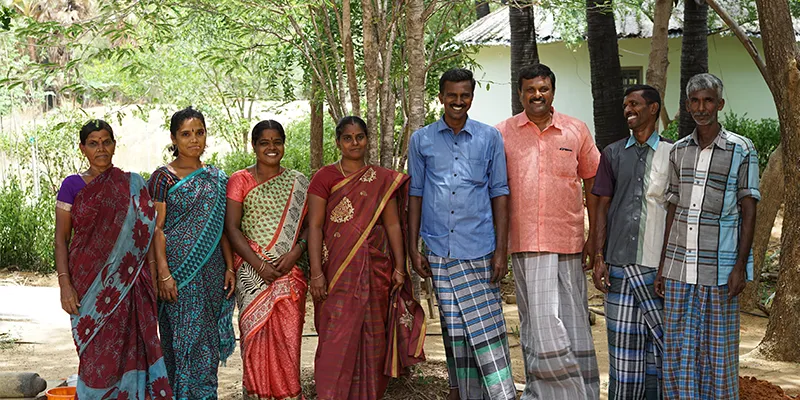From rolling beedis to making sustainable charcoal: these village women are returning carbon to the earth
CharGlo aims to create alternate economic opportunities for rural clusters of women to enable them to break out of the low-income trap.

In the panchayat town of Manimuthar, Tamil Nadu, women from 300 families relied on rolling beedis to make an earning. However, the community decided that doing so wasn’t leading them towards a better life, nor was it good for anyone. In the search for an alternative livelihood, CharGlo was born.
Spearheaded by Mohan Ram, a retired teacher who returned to Manimuthar after five decades, and Sujatha Srinivasan of the Carbon Natives Movement, the community learnt about the natural detox properties of charcoal and identified an opportunity to create a livelihood from an element which was an important part of their daily lives – charcoal residue from firewood used in their cookstoves.
Using this charcoal and other natively-sourced ingredients from Manimuthar such as aloe vera, lemongrass, river sand, etc., CharGlo has created detox products for personal use such as soaps and scrubs.
Apart from the natural detox properties of charcoal, Sujatha says, "It is important to return carbon to the earth and one way to do this is to develop and use products a normal household will use and the charcoal in such products can find their way into the earth".
While acknowledging that there may be other similar products, Sujatha says,
Sustainably produced charcoal is our USP since our larger goal is to use charcoal as a climate mitigation tool. Creating charcoal just for such products negates any positive impact their use will have on the environment.
However, she cautions against making climate change the central point of the campaign as the debate can get abstract and difficult for common people to understand. She is clear that the focus of this campaign is on the community of 300 families in Manimuthar and says, "The first step is selling these products and the next step can be explaining the larger impact of using charcoal to the users".
While Ram and Sujatha are the brains behind the campaign, it has also had the assistance of many people. Sujatha says that the products were developed over many iterations over 14 months and the women were mentored by Dr Raghavan, a Siddha doctor, and only then were the products launched. The group also ran a test on about 100 people to test the reactions of using these products before they could be marketed.
CharGlo is currently running a crowdfunding campaign to kickstart the beta-launch of the ‘earn while you cook’ microenterprise, where donors to the campaign can choose to receive a basket of CharGlo products. Sujatha says that the campaign is very open to feedback since they want to market it as a co-creator producer group and that CharGlo is a proof of concept:
When we approached large companies to use charcoal to develop personal care products, they asked us to prove that charcoal products can be monetised, and therefore, the Manimuthar cluster of 300 families is the proof of concept and will be developed as a successful case study.
In the four weeks since the campaign was launched, it has reached about half its goal, a majority of which is from end users. So how does this money help the women from Manimuthar? Sujatha says, “We have created a development balance sheet, which is on our blog, for users of the product to understand the impact on the cluster.”

With a potential of up to 50,000 products sold per month which will provide seasonal employment to 500 households, the campaign has also calculated the other impacts such as emission reduction and carbon sequestration.
The immediate impact of the campaign, however, is on the community since the campaign creates alternative livelihoods for the women who can then take the first step onto breaking out of the vicious cycle of poverty. While none of these families can be categorised as below-poverty-line families, their low incomes presently restrict their progress.
Thus, Ram also hopes that the extra income will be invested in more promising avenues, such as improving the community school, and creating a digital library and a laboratory in the community. He firmly believes that the money generated has to stay within the community and has therefore decided that 80 percent of all funds collected will be returned to the cluster of families in one way or the other. As against opting for loans or grants for development, he calls this the ‘producer model’ where the communities benefit from their hard work and also contribute to a larger cause.
The campaign is already thinking about the future, looking for sales partnerships abroad which aims to involve more families like those in Manimuthar into developing similar products. With several clusters of villages in rural India who depend on cookstoves, this campaign sees huge potential to grow over the coming years and create a positive economic, environmental, and social impact.







